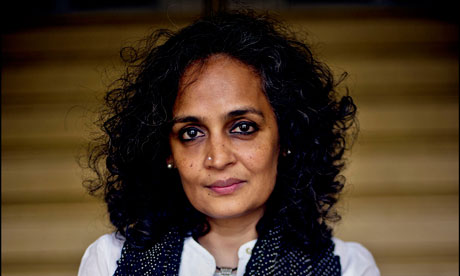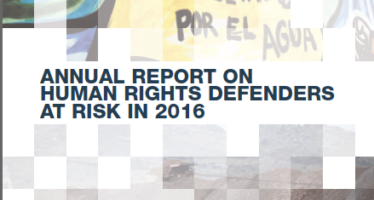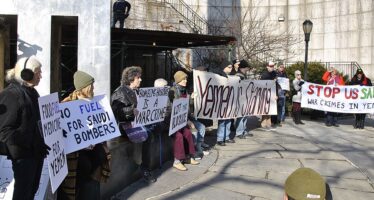Arundhati Roy: ‘They are trying to keep me destabilised. Anybody who says anything is in danger’
![]()
The Booker prize-winning novelist on her political activism in India, why she no longer condemns violent resistance – and why it doesn’t matter if she never writes a second novel
Stephen Moss

Arundhati Roy. Photograph: Sarah Lee
This is not an ideal beginning. I bump into Arundhati Roy as we are both heading for the loo in the foyer of the large building that houses her publisher Penguin’s offices. There are some authors, V S Naipaul say, with whom this could be awkward. But not Roy, who makes me feel instantly at ease. A few minutes later, her publicist settles us in a small, bare room. As we take our positions on either side of a narrow desk I liken it to an interrogation suite. But she says that in India, interrogation rooms are a good deal less salubrious than this.
Roy, who is 50 this year, is best known for her 1997 Booker prize-winning novel The God of Small Things, but for the past decade has been an increasingly vocal critic of the Indian state, attacking its policy towards Kashmir, the environmental destruction wrought by rapid development, the country’s nuclear weapons programme and corruption. As a prominent opponent of everything connected with globalisation, she is seeking to construct a “new modernity” based on sustainability and a defence of traditional ways of life.
Her new book, Broken Republic, brings together three essays about the Maoist guerrilla movement in the forests of central India that is resisting the government’s attempts to develop and mine land on which tribal people live. The central essay, Walking with the Comrades, is a brilliant piece of reportage, recounting three weeks she spent with the guerrillas in the forest. She must, I suggest, have been in great personal danger. “Everybody’s in great danger there, so you can’t go round feeling you are specially in danger,” she says in her pleasant, high-pitched voice. In any case, she says, the violence of bullets and torture are no greater than the violence of hunger and malnutrition, of vulnerable people feeling they’re under siege.
Her time with the guerrillas made a profound impression. She describes spending nights sleeping on the forest floor in a “thousand-star hotel”, applauds “the ferocity and grandeur of these poor people fighting back”, and says “being in the forest made me feel like there was enough space in my body for all my organs”. She detests glitzy, corporate, growth-obsessed modern Indian, and there in the forest she found a brief peace.
-
There is intense anger in the book, I say, implying that if she toned it down she might find a readier audience. “The anger is calibrated,” she insists. “It’s less than I actually feel.” But even so, her critics call her shrill. “That word ‘shrill’ is reserved for any expression of feeling. It’s all right for the establishment to be as shrill as it likes about annihilating people.”
Is her political engagement derived from her mother, Mary Roy, who set up a school for girls in Kerala and has a reputation as a women’s rights activist? “She’s not an activist,” says Roy. “I don’t know why people keep saying that. My mother is like a character who escaped from the set of a Fellini film.” She laughs at her own description. “She’s a whole performing universe of her own. Activists would run a mile from her because they could not deal with what she is.”
I want to talk more about Mary Roy – and eventually we do – but there’s one important point to clear up first. Guerrillas use violence, generally directed against the police and army, but sometimes causing injury and death to civilians caught in the crossfire. Does she condemn that violence? “I don’t condemn it any more,” she says. “If you’re an adivasi [tribal Indian] living in a forest village and 800 CRP [Central Reserve Police] come and surround your village and start burning it, what are you supposed to do? Are you supposed to go on hunger strike? Can the hungry go on a hunger strike? Non-violence is a piece of theatre. You need an audience. What can you do when you have no audience? People have the right to resist annihilation.”
Her critics label her a Maoist sympathiser. Is she? “I am a Maoist sympathiser,” she says. “I’m not a Maoist ideologue, because the communist movements in history have been just as destructive as capitalism. But right now, when the assault is on, I feel they are very much part of the resistance that I support.”
Roy talks about the resistance as an “insurrection”; she makes India sound as if it’s ripe for a Chinese or Russian-style revolution. So how come we in the west don’t hear about these mini-wars? “I have been told quite openly by several correspondents of international newspapers,” she says, “that they have instructions – ‘No negative news from India’ – because it’s an investment destination. So you don’t hear about it. But there is an insurrection, and it’s not just a Maoist insurrection. Everywhere in the country, people are fighting.” I find the suggestion that such an injunction exists – or that self-respecting journalists would accept it – ridiculous. Foreign reporting of India might well be lazy or myopic, but I don’t believe it’s corrupt.
She sounds like a member of a religious sect, I say, as if she has seen the light. “It’s a way of life, a way of thinking,” she replies without taking offence. “I know people in India, even the modern young people, understand that here is something that’s alive.” So why not give up the plush home in Delhi and the media appearances, and return to the forest? “I’d be more than happy to if I had to, but I would be a liability to them in the forest. The battles have to be fought in different ways. The military side is just one part of it. What I do is another part of the battle.”
I question her absolutism, her Manichaean view of the world, but I admire her courage. Her home has been pelted with stones; the Indian launch of Broken Republic was interrupted by pro-government demonstrators who stormed the stage; she may be charged with sedition for saying that Kashmiris should be given the right of self-determination. “They are trying to keep me destabilised,” she says. Does she feel threatened? “Anybody who says anything is in danger. Hundreds of people are in jail.”
Roy has likened writing fiction and polemic to the difference between dancing and walking. Does she not want to dance again? “Of course I do.” Is she working on a new novel? “I have been,” she says with a laugh, “but I don’t get much time to do it.” Does it bother her that the followup to The God of Small Things has been so long in coming? “I’m a highly unambitious person,” she says. “What does it matter if there is or isn’t a novel? I really don’t look at it that way. For me, nothing would have been worth not going into that forest.”
It’s hard to judge whether there will be a second novel. The God of Small Things drew so much on her own life – her charismatic but overbearing mother; a drunken tea-planter father whom her mother left when Roy was very young; her own departure from home in her late teens – that it may be a one-off, a book as much lived as written. She gives ambiguous answers about whether she expects a second novel to appear. On the one hand, she says she is engaged with the resistance movement and that it dominates her thoughts. But almost in the same breath she says others have “picked up the baton” and she would like to return to fiction, to dance again.
What is certain is that little of the second novel has so far been written. She prefers not to tell me what it is about; indeed, she says it would not be possible to pinpoint the theme. “I don’t have subjects. It’s not like I’m trying to write an anti-dam novel. Fiction is too beautiful to be about just one thing. It should be about everything.” Has she been blocked by the pressure of having to follow up a Booker winner? “No,” she says. “We’re not children all wanting to come first in class and win prizes. It’s the pleasure of doing it. I don’t know whether it will be a good book, but I’m curious about how and what I will write after these journeys.”
Are her agent and publisher disappointed still to be waiting for the second novel? “They always knew there wasn’t going to be some novel-producing factory,” she says. “I was very clear about that. I don’t see the point. I did something. I enjoyed doing it. I’m doing something now. I’m living to the edges of my fingernails, using everything I have. It’s impossible for me to look at things politically or in any way as a project, to further my career. You’re injected directly into the blood of the places in which you’re living and what’s going on there.”
She has no financial need to write another novel. The God of Small Things, which sold more than 6m copies around the world, set her up for life, even though she has given much of the money away. She even spurned offers for the film rights, because she didn’t want anyone interpreting her book for the screen. “Every reader has a vision of it in their head,” she says, “and I didn’t want it to be one film.” She is strong-willed. Back in 1996, when The God of Small Things was being prepared for publication, she insisted on having control of the cover image because she didn’t want “a jacket with tigers and ladies in saris”. She is her indomitable mother’s daughter.
I insist she tell me more about her Fellini-esque mother. She is, says Roy, like an empress. She has a number of buttons beside her bed which, when you press them, emit different bird calls. Each call signals to one of her retinue what she requires. Has she been the centre of her daughter’s life? “No, she has been the centre of a lot of conflict in my life. She’s an extraordinary women, and when we are together I feel like we are two nuclear-armed states.” She laughs loudly. “We have to be a bit careful.”
To defuse the family tensions, Roy left home when she was 16 to study architecture in Delhi – even then she wanted to build a new world. She married a fellow student at the age of 17. “He was a very nice guy, but I didn’t take it seriously,” she says. In 1984 she met and married film-maker Pradip Krishen, and helped him bring up his two daughters by an earlier marriage. They now live separately, though she still refers to him as her “sweetheart”. So why separate? “My life is so crazy. There’s so much pressure and idiosyncrasy. I don’t have any establishment. I don’t have anyone to mediate between me and the world. It’s just based on instinct.” I think what she’s saying is that freedom matters more to her than anything else.
She chose not to have children because it would have impinged on that freedom. “For a long time I didn’t have the means to support them,” she says, “and once I did I thought I was too unreliable. So many of the women in India who are fighting these battles don’t have children, because anything can happen. You have to be light on your feet and light in your head. I like to be a mobile republic.”
Roy has in the past described herself as “a natural-born feminist”. What did she mean by that? “Because of my mother and the way I grew up without a father to look after me, you learned early on that rule number one was look out for yourself. Much of what I can do and say now comes from being independent at an early age.” Her mother was born into a wealthy, conservative Christian community in Kerala, but put herself outside the pale by marrying Ranjit Roy, a Hindu from West Bengal. When she returned to her home state after her divorce she had little money and was thus doubly marginalised. The mother eventually triumphed over all these obstacles and made a success of the school she founded, but growing up an outsider has left its mark on her daughter.
Roy says she has always been polemical, and points to her run-in with director Shekhar Kapur in the mid-1990s over his film Bandit Queen – she questioned whether he had the right to portray the rape of a living person on screen without that woman’s consent. It may be that the novel is the exception in a life of agitation, rather than the agitation an odd outcrop in a life of fiction-writing. But has she sacrificed too much for the struggle – the chance to dance, children, perhaps even her second marriage? “I don’t see any of these things as sacrifices,” she says. “They are positive choices. I feel surrounded by love, by excitement. They are not being done in some martyr-like way. When I was walking through the forest with the comrades, we were laughing all the time.”
Related Articles
FRONT LINE DEFENDERS. The Human Rights Defenders Report 2016
![]()
The Dublin-based HUMAN RIGHTS DEFENDERS launched their Annual Report on Human Rights Defenders at Risk in 2016, January 5th 2017
Papua New Guinea: Serious Abuses at Barrick Gold Mine
![]()
Systemic Failures Underscore Need for Canadian Government Regulation February 1, 2011 © 2010 Brent Stirton/Getty Images for Human Rights Watch
Yemen, A Devastated Country Where Impunity Has Become Endemic
![]()
The war in Yemen has been raging for six years, and no end is in sight. Impunity is endemic and Yemen is a devastated country. This statement was published in the Global Rights Report – State of the World’s Impunity 2020




